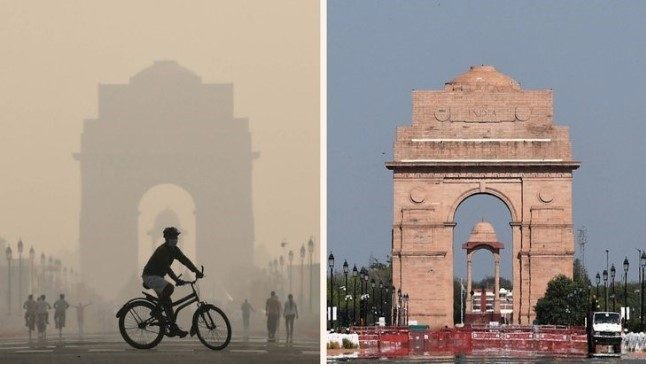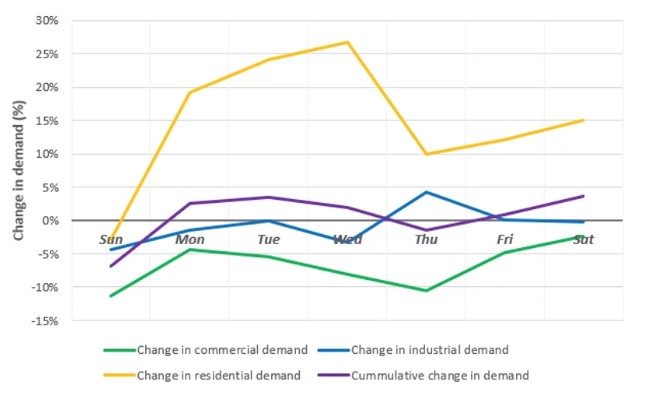The Impact of COVID-19 on the Environment
Ever since COVID-19 emerged we’ve seen it make not only an impact on everyday life, but also on the environment, including a growth in renewable energy usage and cleaner air all over the world. What kind of impact has the pandemic had and will it last once life returns to normal?
Air Pollution
In an attempt to stop the spread of COVID-19, billions of people all over the world have been advised to stay home. This has seen a massive decrease in the need to travel by car, train and plane which are all contributors to global warming through greenhouse gas emissions. Cities all over the world have seen a significant drop in air pollution levels including New Delhi, one of the most polluted major cities in the world. Delhi’s air quality index usually reads a severe 200 on a good day (anything above 20 being deemed unhealthy) but since the nationwide lockdown was imposed on March 24, the meter has regularly dropped below 20 which is the freshest air Delhi has seen in decades. The following image shows just how much air quality has improved in cities all over the world since going into lockdown.

Energy Consumption
There has been an incredibly large drop in demand for almost all major fossil fuels with only renewables holding up. In the US, renewable energy generated more electricity than coal every single day in April. To put it in perspective, the decline is the equivalent of losing the entire energy demand as India which is the world’s third largest energy consumer. Renewable energy is said to be the only energy source that will grow in 2020. As a result of this, global energy-related CO2 emissions are set to fall by almost 8% in 2020, reaching their lowest level since 2010.
In Australia, the decrease in energy demand hasn’t been as significant as other countries. Although we are using less energy commercially or commuting, we are using more residential energy to power our computers/home offices.

The commercial energy demand has dropped whilst the residential energy demand has skyrocketed, particularly for the first three days of the week.
Will the positive effects last?
Obviously once life returns to normal, people will fall back into their old habits and the positive impact COVID19 has had on the environment will likely be reversed. People will be back in cars, trains and planes. This year, 196 countries were intending to implement plans that would meet the emission reduction goals established under the 2015 Paris Agreement. On April 1st, it was announced that the annual summit would be postponed until sometime in 2021. This puts a major hold on the efforts to address climate change.
The federal environmental agency in Brazil announced it would be cutting back on it’s enforcement duties which includes protecting the Amazon from accelerated deforestation which could lead to massive amounts of greenhouse gases being released.
There have been many more delays on climate action all over the world such as China extending deadlines for companies to meet environmental standards, Poland calling for a carbon trading program to be put on hold and the Unites States announcing a rollback on car emission rules. These delays have some fearing the rebound after COVID-19 could be even worse.
There’s no way to be certain of how we and the Earth will come out of this pandemic but once we do there are small changes you can make to old habits that will have a positive effect on the environment.
What can you do?
I feel that the best trend to come out of COVID-19 regarding energy is that has given us the opportunity to assess what we do as individuals and as businesses. It has given us the chance to operate as lean as possible, so perhaps it will teach us how to be less wasteful in the future.
As an individual you can lower waste by riding a bike, walking or even carpooling where possible and invest in reusables rather than single use items. Save electricity by purchasing energy efficient lightbulbs and ensure all electrical appliances are turned off when not in use. Save water by cutting down shower time and turning the faucet off when brushing your teeth.
As a business, you can do your part as well. At The Cluster, we purchase GreenPower accredited electricity to ensure that our coworking space is powered wholly by renewable energy sources. Also, The Cluster has been the first coworking space in Australia to look at the impact offices have on the environment. With that, The Cluster used green energy from day one (back in 2010) and became carbon neutral in 2015, with the help of Cluster members Point Advisory. The Cluster continues to research ways to do more and is grateful that something positive has come out of the Covid-19.